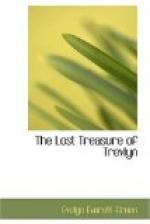And here was Cherry crying, palpitating, trembling in his arms as though some great trouble menaced them.
“What ails thee, sweetheart?” he asked, with playful tenderness; and Cherry choked back her sobs to answer:
“Cuthbert, he has spoken to me of marriage—my father. He has told me plainly what he purposes for me. He and my uncle Dyson have talked of it together. I am to wed my cousin Jacob. O Cuthbert, Cuthbert! what must I do? what must I say?”
Cuthbert heard the news in silence. It was not altogether unexpected, but he had scarce looked to have heard the subject openly broached so soon. Cherry had been regarded in her home as such a child, and her father, sisters, and aunt had so combined to speak and think of her as such, that although her eighteenth birthday was hard at hand, and she was certainly of marriageable age, he had not looked to have to face this complication in the situation quite so quickly. But as he stood holding Cherry in his arms (for she had come to him in the upper parlour at an hour when all the household were elsewhere engaged, and there was no fear of interruption), a look of stern purpose and resolution passed across the young man’s face—an expression which those who knew the Trevlyn family would have recognized as a true Trevlyn look. His face seemed to take added years and manliness as that expression crossed it; and looking tenderly down at the quivering Cherry, he asked:
“Thinkest thou that he has seen or suspected aught?”
“I know not. He said no word of that, only looked hard at me as be spoke of Jacob.”
“And what saidst thou?”




